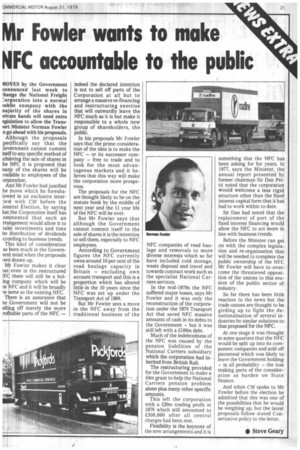Mr Fowler wants to make MFC accountable to the public
Page 23

If you've noticed an error in this article please click here to report it so we can fix it.
; WO ES by the Government inn unced last week to :ha ge the National Freight orporation into a normal ■ ublic company with the najority of the shares in dvate hands will need extra egisiation to allow the Trans oort Minister Norman Fowler o g1 ahead with his proposals. Although the proposals pe ifically say that the 3ov rnment cannot commit tsel to any specific method of ichi ving the sale of shares in he IFC it is proposed that nan of the shares will be Lvailable to employees of the .o ration.
And Mr Fowler had justified he move which he foreshalow d in an exclusive interiew with CM before the ;en ral Election, by saying hat the Corporation itself has omimented that such an rra gement would allow it to la e investments and time he distribution of dividends cc rding to business trends. T is kind of consideration as been much in the Governlen mind when the proposals rer drawn up.
Mk Fowler makes it clear at even in the restructured IF there will still be a ho!in company which will be le 4FC and it will be broadly le ame as the existing NFC. There is an assurance that he Government will not be elling off merely the more rofitable parts of the NFC — indeed the declared intention is not to sell off parts of the Corporation at all but to arrange a massive re-financing and restructuring exercise that will outwardly leave the NFC much as it is but make it responsible to a whole new group of shareholders, the public.
In his proposals Mr Fowler says that the prime consideration of the idea is to make the NFC — or its successor company — free to trade and to look for the most advantageous markets and it believes that this way will make the corporation more prosperous.
The proposals for the NFC are thought likely to be on the statute book by the middle of next year and the 11 year life of the NFC will be over.
But Mr Fowler says that although the Government cannot commit itself to the sale of shares it is the intention to sell them, especially to NFC employees.
According to Government figures the NFC currently owns around 10 per cent of the road haulage capacity in Britain — excluding own account transport and this is a proportion which has altered little in the 10 years since the NFC was set up under the Transport Act of 1968.
But Mr Fowler sees a move in the NFC away from the traditional business of the NFC companies of road haulage and removals to more diverse interests which so far have included cold storage, waste disposal and travel and towards contract work such as the specialist National Carriers services.
In the mid-1970s the NFC suffered major losses, says Mr Fowler and it was only the reconstruction of the corporation under the 1978 Transport Act that saved NFC massive amounts of cash in its debts to the Government — but it was still left with a £100m debt. • Much of the indebtedness of the NFC was caused by the pension liabilities of the National Carriers subsidiary which the corporation had inherited from British Rail.
The restructuring provided for the Government to make a £4m grant to help the National Carriers pension problem alone plus many other specific amounts.
This left the corporation with a £20m trading profit in 1978 which still amounted to £300,000 after all central charges had been met.
Flexibility is the keynote of the new arrangements and it is something that the NFC has been asking for for years. In 1977, says the Minister, the annual report presented by former chairman Sir Dan Pettit noted that the corporation would welcome a less rigid structure other than the fixed interest capital form that it has had to work within to date.
Sir Dan had noted that the replacement of part of the fixed interest financing would allow the NFC to act more in line with business trends.
Before the Minister can get on with the complex legislation and re-organisation that will be needed to complete the public ownership of the NFC Mr Fowler will have to overcome the threatened opposition of the unions to this erosion of the public sector of industry.
So far there has been little reaction to the news but the trade unions are thought to be girding up to fight the denationalisation of several industries by similar solutions to that proposed for the NFC.
At one stage it was thought in some quarters that the NFC would be split up into its component companies and sold off piecemeal which was likely to leave the Government holding — in all probability — the loss making parts of the consideration as burden on State finance.
And when CM spoke to Mr Fowler before the election he admitted that this was one of the possibilities that he would be weighing up, but the latest proposals follow stated Conservative policy to the letter.
• Steve Geary




































































































